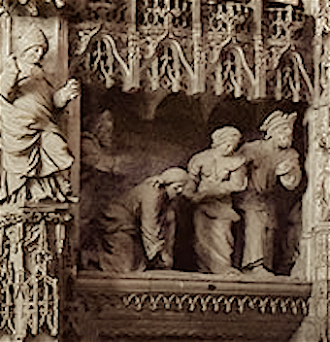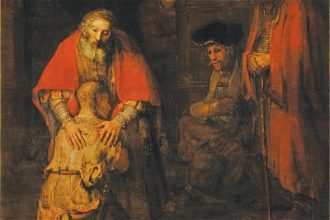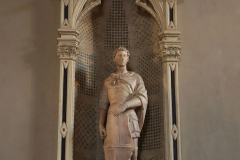Pax Christi Reflection for Fifth Sunday in Lent - Do not stay in the past; make openings for new beginnings

Jesus writes in the sand - Chartres Cathedral choir screen
Is 43:16-21 | Ps 126 (125) | Phil 3:8-14 | Jn 8:1-11
Once, a people had left slavery behind. They found a way through the turbulent sea with an entire army chasing after them. Then they went through a long, difficult journey in the desert. That exodus remains in the memory. Prophets say that a new exodus is always possible: "Don't stay in the past." God says: "I am undertaking something new." The beginning is already there, don't you see it? A new exodus is possible for a people that can pull away from their burdensome past.
In this period of Lent, God is guiding us in our efforts to move and transform from slavery to freedom, from evil to good, from war to peace, and from injustice to justice. Evil, injustice and war still exist in our world. War, just as slavery, should be abolished.
Do we need scapegoats?
Labelling a person as a legitimate target is a nerve-racking tactic in present-day violence. Whether it is a terrorist group pointing to a lawyer or a building contractor, or whether it is a fundamentalist leader singling out a writer for execution, the fear aroused often evokes a sense of powerlessness in the community of the endangered person. Usually the labeled one is represented as a threat to some value that is important to the group; they in turn proffer execution as the best solution to protect their interest. Their authority to execute comes from their inner self-righteousness as guardians of what is good. Our human history has regularly designated scapegoats in order to resolve a conflict. Often it is a different people or nation, or a different religion, that we call scapegoats. Eliminating a scapegoat can only bring peace for a while and only for the powerful, but is not a structural solution to conflicts. The outbreak of discontent and war remains a possibility.
Execution horrifies us but character assassination is alive and well among us. To eradicate it from our lives would make us more human and make our families and communities oases of peace, joy and hope. To refuse to do so is to allow the cataract of self-righteousness to blind us forever.
The pillory - the end of future
In the centre of Dworp, a village close to Brussels, near the old town hall, there is a pillory that is now a monument. I can imagine it was no fun being tied to it when you had done something wrong or something that was not acceptable to those in charge. Today we no longer use that pillory. To put someone to shame now happens in other ways: via the internet, Facebook, Twitter and other social media for example. Pin people down for their behaviour so that they no longer have a future. It certainly happens.
The scribes and Pharisees make use of a woman, a public sinner, to put before Jesus a specific dilemma. The woman is only a "case" to make Jesus stumble. According to the Law, she must be stoned. Practices like this still exist today. So how does Jesus react? He writes in the sand. Opposite the words of the Law carved in stone, Jesus writes in the sand. You can wipe out what is in the sand with one gesture. This gesture of Jesus is of great significance. What he wants to say follows in his response: "He who is without sin must throw the first stone."
Those words give a different turn to the situation. The Law may be so, but take a different look. Look at the person in front of you. It is possible that this person, here this woman, has misbehaved. However, a person is always more than his or her actions. Look at yourself for that, and you realise that there is also a lack of wholeness in yourself, even failure. How often do we ourselves have to count on the patience or mercy of others? Would God not have that patience, he who is Mercy himself?
Opening to new life and a future
We find Jesus in the temple of Jerusalem. Scribes and Pharisees wave the law to give an adulterous woman her appropriate punishment. Jesus sees through them. Quietly he says: "He who is without sin may throw the first stone" One by one they drop off, the elders first.
They drop off, these would-be attackers. The closed circle around the woman opens. The future dawns again. "Go and sin no more." The word of Jesus makes that future visible. It means: "I don't pin you down for your past. I don't judge you. A new beginning is always possible for God." That sounds incredibly liberating. God wants life for us; he does not work with pillories. God asks that we would also grant each other this. Such a road leads to Easter. We can hopefully continue on that way.
Human rights are the underlying foundation of peace work
People can revive again, even after difficult times. God's answer is that we should make room for mercy for everybody, for each human being. Each person has the right to live in dignity and experience the values of human rights in a reciprocal manner. Jesus breaks open the spiral of evil and opens perspectives for a new beginning for those who have made mistakes in their lives.
The dignity of human life is the cornerstone and foundation of human rights. When human rights are neglected, a systematic exclusion of the vulnerable happens. People are part of different social networks: family, upbringing, culture, religion, career, etc. The (shared) responsibility for social/public life lies with people themselves in the first place. Jesus calls the woman, a public sinner, to change her life, convert, and is reminding the broader society of creating learning places of hope and new perspectives as a way forward.
New life includes hope for a better way to live together
Hope is an expression of confidence and is based on the belief that the situation today is better than that of yesterday and that tomorrow it will be better than today.
There is a spiritual conception of hope: the belief in the redemption of humanity through the liberation of sin. People cannot continue without hope. In a way, we all share the calling to be "givers of hope" to one another. Give hope. Encourage each other and try to be ahead of despair, or to at least make room for despair to pass through your life. Hope is central to our Christian culture, just like belief and love.
In the secular sense of the word, hope represents the belief in one's own identity, in one's ability to interact with the world in a positive way. Hope is the opposite of resignation or surrender; rather it is a form of confidence that encourages us to draw close to other people, to accept how they are different from us without fear. Peace workers are people of hope and pass that hope on to others.
We continue our Lenten season, a time of stillness, austerity and preparation for Easter.
For more Lenten resources and an archive of these reflections, click HERE.
Rev Paul Lansu is Senior Policy Advisor, Pax Christi International





















